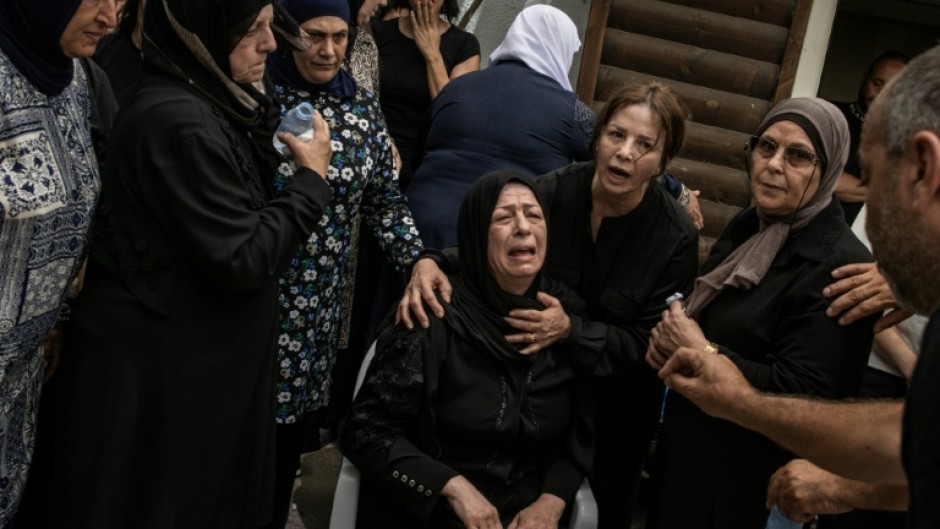TEHRAN - Israel and Iran exchanged fire again on Tuesday, the fifth day of strikes in their most intense confrontation in history, fuelling fears of a drawn-out conflict that could engulf the Middle East.
The adversaries have for years waged a shadow war through proxies and covert operations, with Israel fighting Iranian-backed groups such as Hamas since October 2023.
Here are the latest developments:
- 'Unconditional surrender' -
US President Donald Trump dramatically stepped up his rhetoric against Iran's supreme leader Tuesday, saying on social media that the United States knows where Ayatollah Ali Khamenei is located but will not kill him "for now".
In another post, Trump also appeared to demand Iran's "UNCONDITIONAL SURRENDER!" as he fuelled questions about whether the United States would join Israel's attacks on Tehran's leadership and nuclear facilities.
Trump earlier said he wanted a "real end" to the conflict, not just a ceasefire.
Vice President JD Vance said in a post on X that Trump "may decide he needs to take further action to end Iranian enrichment".
G7 leaders, including Trump, had issued a call on Monday for "de-escalation" of the conflict, but it was accompanied by criticism of Iran and support for Israel's right to defend itself, drawing a rebuke from Tehran.
British Prime Minister Keir Starmer said there was nothing to suggest Trump "is about to get involved in this conflict", which has rapidly escalated despite calls from world leaders to halt the attacks.
Beijing accused Trump of "pouring oil" on the intensifying conflict.
- Latest exchanges -
Israel's military said it launched at least two waves of strikes Tuesday targeting missile and drone sites in western Iran.
An AFP journalist heard a series of loud explosions in north Tehran, while Iranian media reported blasts in Isfahan, which hosts multiple nuclear facilities.
Israel said it intercepted "most" of a fresh barrage of missiles fired from Iran after air raid sirens sounded in Tel Aviv and northern parts of the country.
An earlier barrage caused some damage and started a fire in the Tel Aviv area, officials said.
Iranian state television announced a 10th wave of attacks on Israel in the evening. Air raid sirens sounded a litte while later in Dimona, a town in southern Israel home to a nuclear facility, with no immediate reports of any hits.
As of Sunday, Israeli attacks had killed at least 224 people and wounded more than 1,200 in Iran, the health ministry said. The deaths include top military commanders and nuclear scientists.
At least 24 people have been killed and 592 wounded in Iran's attacks on Israel, the office of Israeli Prime Minister Benjamin Netanyahu said.
- Israel lays out objectives -
Netanyahu said Israel was "changing the face of the Middle East" with its military campaign, which could lead to "radical changes" in Iran.
Israel sought to eliminate Iran's nuclear programme, its "ballistic missile production capability, and the... axis of terrorism", Netanyahu said, referring to Iranian-backed militant groups in the Middle East.
He has also not ruled out killing the supreme leader.
German Chancellor Friedrich Merz expressed support for the campaign, saying in an interview that "this is the dirty work Israel is doing for all of us" against Iran's "mullah regime".
In a separate interview, he said Tehran was "considerably" weakened, adding: "I can hardly imagine the mullah regime returning to its old functions."
Iran has said its targets in Israel included "sensitive and important" security sites, including the headquarters of the Mossad spy agency.
- Internet cuts -
Iranian media reported widespread internet disruption on Tuesday.
It was not immediately clear what caused the disruption. Iran has imposed internet restrictions since Israel began its aerial campaign.
A cyberattack on Tuesday crippled Sepah Bank, one of Iran's main state-owned banks, the Fars news agency reported.
- Natanz 'impact' -
Israel has carried out repeated strikes on Iran's key nuclear sites despite warnings from the UN nuclear watchdog, the International Atomic Energy Agency, that such military action is in breach of international law.
The IAEA said Tuesday that it had detected signs of "direct impacts" to the underground part of Iran's uranium enrichment facility at Natanz, struck on Friday.

